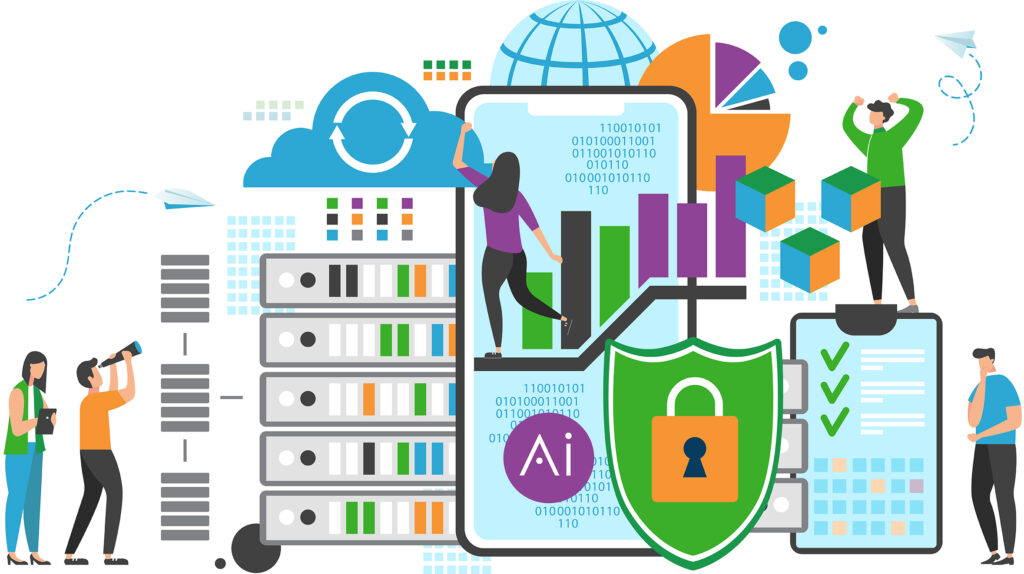In our last post, we provided insights into how effectively managed data architectures and pipelines can power generative data models to create human-like outputs.
In this post, we look at how the platform engineering team can partner with data engineers to help accelerate the time to value while alleviating some inherent issues with this burgeoning capability area.
Manage AI Risk by Adopting Platform Engineering Best Practices
The dangers with AI are clear. The technology can run amok without a well-defined framework, allowing businesses to leverage AI without guidance or control. A McKinsey report reveals that:1
- Companies insufficiently mitigate the risks connected to generative AI’s rapid growth
- A minority (32%) of respondents take measures to prevent inaccuracies
- Just 38% were managing cybersecurity risks specifically
The report also stresses proactive risk management strategies—which shouldinclude confidentiality, integrity, and availability—to prevent reputational harm, customer attrition, market devaluation, and increased regulatory scrutiny. Looking to platform engineering for inspiration, several principles can be explored to plan enhanced responses to the many challenges connected to AI development and delivery:
Rapid Expansion: Guide the design of AI systems to handle rapid growth and expanding integrations across various business processes.
Cross-functional Collaboration: Involve diverse stakeholders from various backgrounds, functions, and locations to enable multidisciplinary collaboration.
Risk Mitigation: Adopt proactive strategies to identify and mitigate potential cybersecurity risks in application and API development, delivery, and operations.
Quality Assurance: Ensure high quality and reliability to prevent inaccuracies and biases in AI processes and outcomes.
Ethical Considerations: Navigate complex regulatory environments and company values to comply with evolving data privacy, AI ethics, and consumer protection requirements.
Achieve AI Excellence through Operational Unification
While data engineers are pivotal in refining data to protect sensitive information, platform engineering is the custodian of the services, overseeing how this data is applied within the services offered. This alliance of platform engineering principles with data engineering insights provides a reliable platform for AI abstractions which can unlock several unmatched AIOps, DevOps, and DevSecOps outcomes, including:
Scalability and Reliability: Platform engineering can provide the infrastructure to handle large volumes of data and deploy multiple AI models concurrently. They can help ensure AI model high availability and performance. This provides a more consistent and high-quality customer experience through a scalable and reliable AI infrastructure.
Shared Guardrails: The platform engineering program can provide a common framework to establish codified rules to maintain the systems’ consistency, accuracy, and safety using AI models and data. Guardrails for data access, model training, model prompting, and content generation (the output) keep all AI models within the defined limits and maintain the necessary separation of duties. For instance, allowing separate systems and applications to train versus prompt and preventing them from doing both can reduce the chances of data misuse, exposure, or quality issues.
Checks and Balances: Checks can be set up—sometimes even automated—to monitor various stages of the AI lifecycle. These checks can help detect anomalies, biases, and errors across data collection, training, deployment, and auditing. Automation can reduce demand for manual intervention, the likelihood of human error, or the need to refactor a solution after its launch. This can also improve the quality of AI models by continuously evaluating and improving based on real-world performance and feedback.
Privacy and Security: The platform engineering program can enhance data privacy and security by implementing shared data management and security practices. These include data processes, services, and APIs that enable encryption and anonymization. In addition, the platform can provide standard rules and services to help manage data access controls, ensuring only authorized individuals and systems can access AI models, prompts, data sets, and outputs.
Compliance and Governance: Platform engineering can help standardize the development and operation of AI models throughout the organization. This can apply to the model development process, data formats, and APIs. In addition to reduced complexity and improved interoperability, this can help establish and maintain compliance with various frameworks, regulations, and governance policies. This can also include shared tools for auditing, logging, and reporting, which can demonstrate compliance and maintain transparency in the operation of AI models.
Responsibly Harness the Power of AI
The new age of AI holds immense promise. Yet, as with all powerful tools, responsible deployment and use is essential. The collaboration between data and platform engineers is the linchpin product teams need to manage confidentiality, integrity, and availability, allowing them to keep foresight, precision, and safety in mind as they advance into the AI-driven future.
- McKinsey, The State of AI in 2023: Generative AI’s Breakout Year, August 2023
